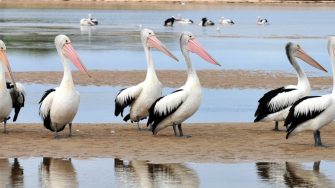
Overview
The UNSW Evolutionary and Physiological Ecology (BIOS2011), opens in a new window course introduces you to the functional relationships between living organisms and their environments. With an emphasis on Charles Darwin’s Theory of evolution, you’ll study the interactions between populations and ecological energetics and ecophysiology.
Evolution by natural selection is one of the best substantiated theories in the history of science. It is supported by evidence from a wide variety of disciplines. Examples include geology, genetics, quantitative genetics and developmental biology.
This second-year course considers the adaptive challenges that individuals face. You’ll study the way in which evolution shapes species to meet those challenges, such as environmental change, epigenetics, and population biology.
You’ll learn about the relationships between three primary levels of biological organisations:
- The individual organisms.
- Populations of individuals.
- Communities of species.
Term offering: Term 1
Course attendance: In person
Level: Undergraduate - Second year
Discipline: Biology
Course code: BIOS2011
Course breakdown
Evolutionary and Physiological Biology is a key introductory course to all upper-year Biology courses. You’ll develop course content, experimental design, data interpretation and science communication skills.
Major topics covered throughout the course include:
- adaptation and speciation
- the evolution of life histories
- population dynamics
- predator/prey and herbivore/plant interactions
- animal behaviour
- competition
- community ecology.
Conditions for enrolment
Before enrolling in this course, it’s assumed you have completed Evolutionary and Functional Biology (BIOS1101)., opens in a new window
Career opportunities
Earth scientists explore the nature, evolution and structure of our planet, studying everything from natural crystals to fossils and volcanoes. The study of earth science looks to better understand our planet and predict the future. This is based on known environmental patterns like weather and tectonic plate movement. At UNSW Science, you can become an expert in this field by specialising in the earth science major.
Relevant roles
- Meteorologist
- Geologist
- Geophysicist
- Hydrologist
- Ecologist
- Environmental scientist
- Natural resource manager
- Marine scientist
- Marine biologist
- Environmental scientist
Find out more
For more information, please contact Michael Kasumovic., opens in a new window
E: m.kasumovic@unsw.edu.au, opens in a new window
T: + 61 2 9385 8091
